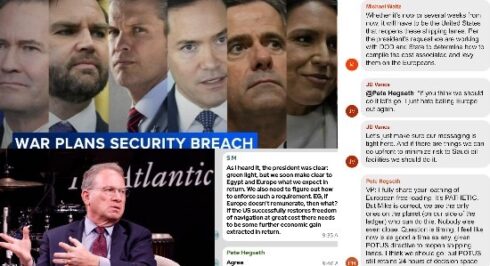A bombshell report from The Atlantic has exposed discrepancies in testimonies given by former Representative Tulsi Gabbard and former Director of National Intelligence John Ratcliffe regarding a classified Signal group chat discussing U.S. military operations. The report contradicts their sworn statements before Congress, in which they denied that classified information was shared. However, newly revealed messages from the chat indicate that specific details on military strikes, targets, and intelligence assessments were discussed.
The White House has also maintained that no classified material was disclosed in the chat. However, The Atlantic’s findings now raise concerns over potential national security breaches and misrepresentations at the highest levels of government.
The Signal Chat: A Breach of Operational Security?
The Signal group chat, named “Houthi PC Small Group,” was reportedly created for high-level discussions on U.S. military actions against Houthi targets in Yemen. Among its participants were Tulsi Gabbard, John Ratcliffe, Congressman Mike Waltz, journalist Jeffrey Goldberg, and several top military officials.
At 11:44 AM Eastern Time on the day of the attack, Pete Hegseth posted an update detailing the precise timeline of upcoming military operations. His message included specifics such as the launch time for F-18 fighter jets, the trigger windows for drone strikes, and the expected detonation times for airstrikes. This level of detail directly contradicts claims that the chat did not contain classified information.
By 1:48 PM, Mike Waltz shared real-time intelligence from the attack site, reporting a collapsed building and the confirmed identification of a Houthi target. The exchange of messages continued, with participants celebrating the success of the mission, even as the Houthi-run Yemeni health ministry reported at least 53 casualties.
Tulsi Gabbard and Ratcliffe Congressional Testimonies Under Scrutiny
During a Senate Intelligence Committee hearing, both Tulsi Gabbard and John Ratcliffe denied any classified information was exchanged in the Signal chat. Gabbard stated, “There was no classified material that was shared in that Signal group.” Ratcliffe echoed her remarks, insisting that his messages were “entirely permissible and lawful.”
Despite these denials, The Atlantic’s report proves otherwise. The messages exchanged among high-ranking officials contained sensitive military details that, if leaked to adversaries, could have jeopardized the mission and American personnel. This revelation raises serious ethical and legal concerns about whether Gabbard and Ratcliffe knowingly misled Congress.
The White House Response and National Security Implications
President Donald Trump also downplayed the controversy, stating, “It wasn’t classified information.” However, security experts argue that the detailed operational updates shared in the chat could constitute a violation of national security protocols. The casual manner in which military strategies were discussed in an unsecured chat raises further concerns about the handling of sensitive information at the highest levels.
Additionally, the inclusion of journalist Jeffrey Goldberg in the group chat remains a mystery. Congressman Waltz, who reportedly added Goldberg, has claimed he is investigating “how the heck he got into this room.” Regardless of how it happened, the mistake resulted in classified discussions being exposed, further intensifying the controversy.
White House and Intelligence Officials Deny Wrongdoing
Despite the evidence presented in The Atlantic’s report, the White House has maintained that no classified military plans were discussed in the Signal chat. President Donald Trump, addressing the controversy, insisted, “It wasn’t classified information.”
Tulsi Gabbard and John Ratcliffe echoed this sentiment during a Senate Intelligence Committee hearing. Gabbard stated, “There was no classified material that was shared in that Signal group.” Ratcliffe similarly defended his participation, saying, “My communications were entirely permissible and lawful and did not include classified information.”
However, The Atlantic’s findings directly contradict these claims, suggesting that both officials misled Congress. If proven true, this could have serious legal consequences for Tulsi Gabbard and Ratcliffe. Calls for Investigation and Accountability
In light of these revelations, lawmakers and security analysts are calling for a full-scale investigation into the handling of classified information within the U.S. government. The discrepancies between sworn testimonies and the content of the Signal chat raise potential legal consequences for Tulsi Gabbard, Ratcliffe, and other officials involved.
With The Atlantic providing undeniable evidence of classified discussions, pressure is mounting for accountability. If it is determined that officials knowingly lied to Congress, they could face perjury charges and other legal repercussions.
As this controversy unfolds, the American public is left questioning the integrity of its leaders and the security measures in place to protect classified military operations.














